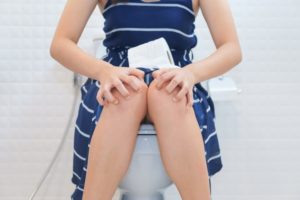
In order to regain control of your bladder, there are some things you can do. There are common triggers that increase your risk of bladder leaks, and if you limit or avoid these triggers, you can reduce the risk.
5 Triggers of Bladder Leaks to Avoid
Alcohol: If you’re prone to bladder leaks, it’s advised you avoid or limit alcohol. Alcohol irritates the bladder and contracts and relaxes the primary muscle of the bladder wall, which triggers the release of urine.
Lack of fluid: You may think the fewer fluids you intake, the less you will have to urinate, but this isn’t true. In fact, too little urine causes what is in the bladder to become concentrated, which then irritates the bladder, leading to bladder leaks. Ensure you’re staying well hydrated, and if anything, limit fluids prior to bed to reduce the risk of nighttime urination.
Certain medications: Certain medications like alpha-blockers or anti-depressants can trigger the bladder. Do not stop medications without your doctors’ consent. If you believe your medications are to blame for your bladder leaks, speak with your doctor about other options.
Obesity: Being overweight can put added stress on the bladder. Studies have shown patients who undergo gastric bypass surgery experience improvements in bladder leaks. Even if you aren’t so overweight that surgery is required, consider eating better and exercising more to lose those extra pounds.
Constipation: Straining of the bowels puts added stress on the pelvic floor muscles. Furthermore, bowels which are not regularly emptied puts added pressure on the bladder itself. Find natural and safe ways to treat constipation and experience fewer bladder leaks.
Many people suffer from bladder leaks in silence even though there are plenty of treatment options available. Speak to your doctor if your bladder is controlling your life.
Also read:
- Natural bladder supplements: 18 herbal remedies for overactive bladder
- 9 Yoga poses to strengthen your bladder